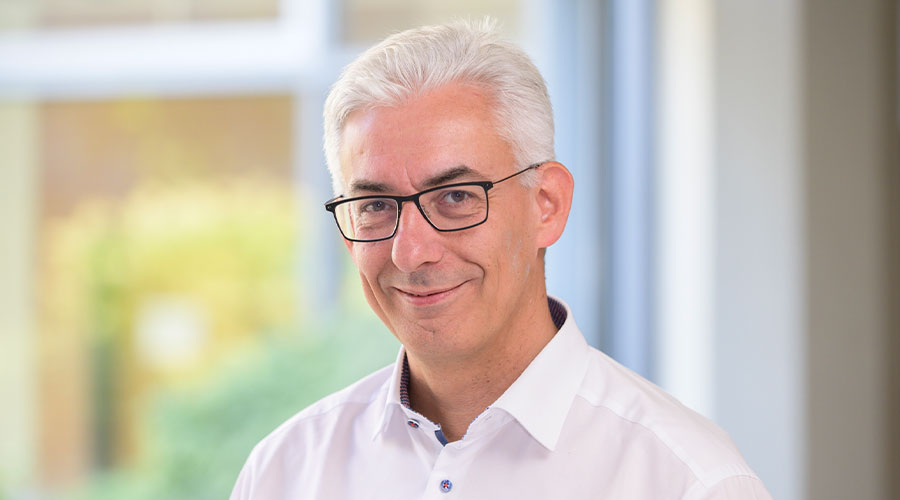| My Research Interest in RESIST |
We are generally interested in infections of the nervous system. Within RESIST our focus is on neurovirological infections and in particular with herpes viruses. The most common neuroinfectios condition is herpes zoster that is caused by varicella zoster virus (VZV). Since the clinical course of VZV infection varies tremendously between patients we want to identify determinants for a complicated clinical course with involvement of the central nervous system or with disabling post zoster neuralgia (PZN).
We want to achieve this on one hand be investigating genetic determinants these patients and on the other hand by searching for biomarker in the cerebrospinal fluid of patients suffering VZV infection. These informations will give clues for a better clinical management of patients with VZV infections and may also be the basis to identify new targets for the treatment of severe courses of VZV infections.
Prof. Stangel about his scientific work
Prof. Dr. Martin Stangel – Curriculum Vitae
Current Position
Undergraduate and Postgraduate Training
Academic and Research Posts
Other Scientific Roles
Awards and Prizes

Selected Publications
Chhatbar C, Detje CN, Grabski E, Borst K, Spanier J, Ghita L, Elliott DA, Costa Jordão MJ, Mueller N, Sutton J, Prajeeth CK, Gudi V, Klein MA, Prinz M, Bradke F, Stangel M*, Kalinke U*. Type I interferon receptor signaling of neurons and astrocytes regulates microglia activation during viral encephalitis. Cell Reports 2018;25:118-129. IF 8.032
Stangel M, Kuhlmann T, Matthews PM, Kilpatrick TJ. Achievements and obstacles for remyelinating therapies in multiple sclerosis. Nat Rev Neurol 2017;13:742-754. IF 19.819
Skripuletz T, Manzel A, Gropengießer K, Schäfer N, Gudi V, Singh V, Salinas Tejedor L, Jörg S, Hammer A, Voss E, Vulinovic F, Degen D, Wolf R, Lee D-H, Pul R, Moharregh-Khiabani D, Baumgärtner W, Gold R, Linker RA, Stangel M. Pivotal role of choline metabolites in remyelination. Brain 2015;138:398-413. IF 9.196
Bénardais K, Gudi V, Gai L, Neβler J, Singh V, Prajeeth CK, Skripuletz T, Stangel M. Long-term impact of neonatal inflammation on de- and remyelination in the central nervous system. Glia 2014;62:1659-1670. IF 6.031
Skripuletz T, Hackstette D, Bauer K, Gudi V, Pul R, Voss E, Berger K, Kipp M, Baumgärtner W, Stangel M. Astrocytes regulate myelin clearance through recruitment of microglia during cuprizone induced demyelination. Brain 2013;136:147-167. IF 9.196
Stangel M, Fredrikson S, Meinl E, Petzold A, Stüve O, Tumani H. The utility of CSF analysis in patients with multiple sclerosis. Nat Rev Neurol 2013;9:267-276. IF 15.358
Voß EV, Škuljec J, Gudi V, Skripuletz T, Pul R, Trebst C, Stangel M. Characterisation of microglia during de- and remyelination: can they create a repair promoting environment? Neurobiol Dis 2012;45:519-528. IF 4.856
Skripuletz T, Lindner M, Kotsiari A, Garde N, Fokuhl J, Linsmeier F, Trebst C, Stangel M. Cortical demyelination is prominent in mice using the cuprizone model and is strain dependent. Am J Pathol 2008;172:1053-1061. IF 4.206
Stangel M, Boegner F, Klatt CH, Hofmeister C, Seyfert S. A placebo-controlled pilot trial to study the remyelinating potential of intravenous immunoglobulins in multiple sclerosis. J Neurol Neurosurg Psychiatry 2000;68:89-92. IF 6,431
Collawn JF, Stangel M, Kuhn L, Esekogwu V, Jing S, Trowbridge IS, Tainer JA. Transferrin receptor internalization sequence YXRF implicates a tight turn as the structural recognition motif for endocytosis. Cell 1990;63:1061-1072. IF 28.710


